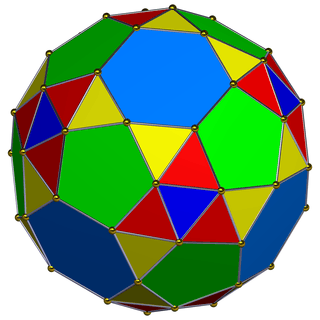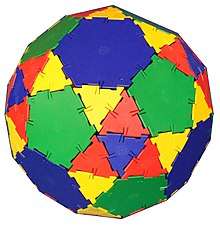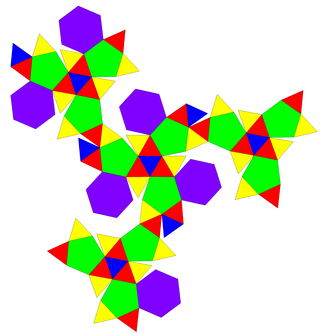Pentahexagonal pyritoheptacontatetrahedron
In geometry, a pentahexagonal pyritoheptacontatetrahedron is a near-miss Johnson solid with pyritohedral symmetry. This near-miss was discovered by Mason Green in 2006. It has 6 hexagonal faces, 12 pentagonal faces, and 56 triangles in 3 symmetry positions. Mason calls it a hexagonally expanded snubbed dodecahedron.[1]
| Pentahexagonal pyritoheptacontatetrahedron | |
|---|---|
 | |
| Faces | 74: 6 hexagons 12 pentagons 8+24+24 triangles |
| Edges | 132 |
| Vertices | 60 |
| Symmetry group | Th, [3+,4], (3*2), order 24 |
| Rotation group | T, [3,3]+, (332), order 12 |
| Properties | convex |

Model built with polydron
With regular hexagons and pentagons it is a symmetrohedron.[2] The triangle are not equilateral with triangle-triangle edges compressed by 1.8%.
It has 3 vertex configurations, 3.3.5.6, 3.5.3.6, 3.3.3.3.5, with the last shared in the snub dodecahedron.
Net

Net
gollark: Yes, it is a kernel module which provides a pi device file.
gollark: Which should really be Unicode aware and support /dev/π.
gollark: It would be about as useful as that /dev/pi module.
gollark: Idea: kernel space yes module for improved performance.
gollark: Sadly my phone CPU is weak and it can only do yes at 500MB/s.
See also
- Tetrated dodecahedron has tetrahedral symmetry
References
- Near Misses based on dodecahedra
- Kaplan, Craig S.; Hart, George W. (2001), "Symmetrohedra: Polyhedra from Symmetric Placement of Regular Polygons", Bridges: Mathematical Connections in Art, Music and Science (PDF).
External links
This article is issued from Wikipedia. The text is licensed under Creative Commons - Attribution - Sharealike. Additional terms may apply for the media files.